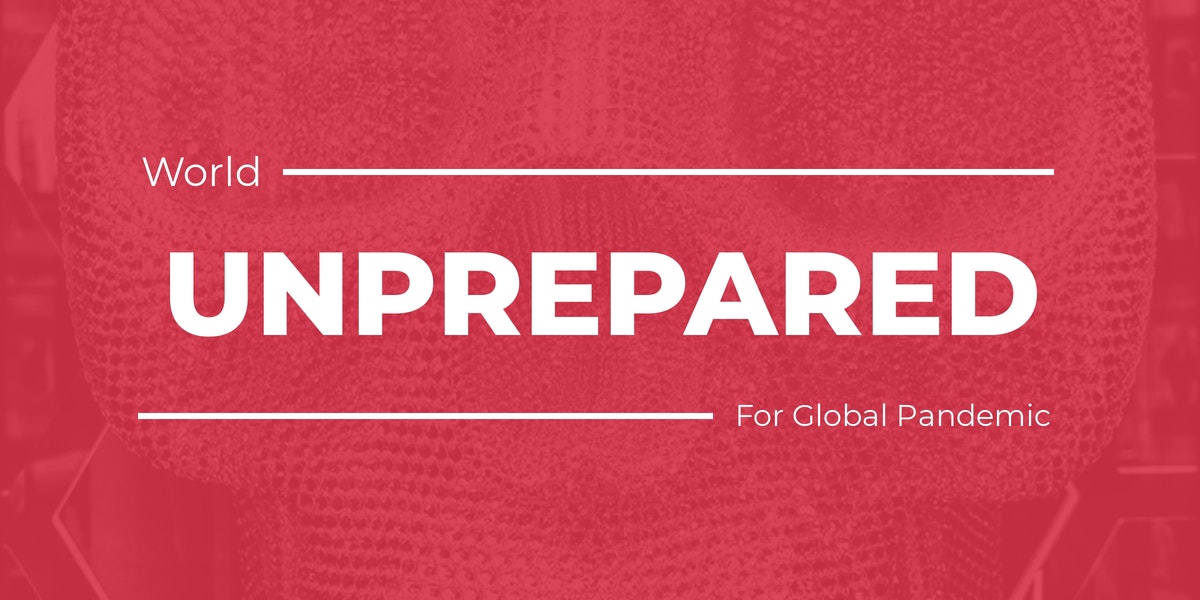According to recent reports release by the World Health Organization (WHO), the world is at increased and growing risk for a global pandemic on par with the 1918 Spanish Flu outbreak.

What Does a Global Pandemic Look Like?
The 1918 influenza (H1N1) pandemic, commonly referred to as the Spanish Flu, lasted from approximately January 1918 to December 1920.
Due to inadequate data and suppressed reporting, the full scale of the pandemic will likely never be known.
However, it is estimated that the Spanish Flu infected approximately 500 million people worldwide--killing between 50 and 100 million (app. 675,000 in the U.S.), or roughly 3 to 5 percent of the global population, and effectively reducing the life expectancy of U.S. citizens by 12 years in the first year of the outbreak.
It has been ascertained that the H1N1 strain was no more aggressive than usual.
Instead, the widespread death toll was attributed to bacterial superinfection--a secondary bacterial infection superimposed on a previous viral infection--as the result of overcrowding, malnourishment, and poor hygiene.
For More Information:
Subsequent pandemics include:
- The 1957-1958 Asian influenza (H2N2) - Killed 1.1 million worldwide and 116,000 in the U.S.
- The 1968 pandemic (H3N2) - Killed approximately 1 million worldwide, and 100,00 in the U.S., and;
- The 2009 H1N1 pandemic (H1N1pdm09) - Killed between 150,000 to 500,000 plus people worldwide, and 12,469 in the U.S.
Source:
Further, according to CNN Health;
Between 2011 and 2018, WHO tracked 1,483 epidemics worldwide, including Ebola and severe acute respiratory syndrome (SARS), the report said.
These epidemics and pandemics devastated many of their host countries -- the West Africa Ebola outbreak resulted in a loss of $53 billion in economic and social cost.
These huge economic costs translate to severe real-life consequences -- lost jobs, forced displacement, inaccessible healthcare, and greater mortality.
The risk of a global pandemic is growing -- and the world isn't ready, experts say
Why we are not Prepared
The rising risk of a global pandemic stems from several factors, including:
- Advancements in travel which allow a person to travel anywhere in the world within 36 hours.
- The absence of primary health care or health care infrastructure in poorer countries.
- The inability of poorer countries to enforce International Health Regulations guidelines to restrict travel.
- Increasing global temperatures causing a rise in disease-carrying mosquito populations.
- A distrust of health services, and;
- Armed conflict.
Preventative Measures
While world leaders meet to discuss methods for addressing and responding to global outbreaks, many are left wondering what they can do to protect themselves.
Currently, no vaccine exists to protect against pandemic influenza outbreaks, as well as many other viruses that could potentially threaten worldwide populations and economies.
However, a potentially superior and more cost-effective alternative exists--cleaning, disinfecting, and hand hygiene, combined with integrated pest control services.
The influenza virus is spread through direct contact with a contaminated surface, or exposure to contaminated air, and the former is more likely than the latter.
A routine high-performance cleaning program combined with regular disinfection services via an electrostatic disinfection appliance has been shown to significantly limit the spread of influenza and other germs, even in elementary schools during flu season.
Additionally, previous surveys have cited a high number--more than 60% of respondents--attributed their absence of illness to regular hand washing as opposed to vaccination.
References & Resources
Takeaway
Global pandemics have wreaked havoc across the planet before, and they will again in the future--the question is not a matter of if, but when.
The results for an unprepared population could be devastating.
According to the World Bank;
A severe pandemic can result in millions of deaths, and even the most conservative estimates suggest that pandemics destroy up to 1% of global GDP, which is comparable to other top-priority threats, such as climate change.
Recent economic work estimates that the annual global cost of moderately severe to severe pandemics is roughly $US 570 billion, or 0.7% of global income.
While world leaders struggle to find solutions to address the rising challenge--individuals, business leaders, and school administrators at home can take proactive action now to limit the spread of viral infections and secondary bacterial superinfections, including:
- Implementing standard disaster preparedness.
- Practicing high-quality hygiene with soap and clean water, and;
- Implementing a higher standard of cleanliness and disinfection in public facilities and transportation vehicles to deny viruses their primary method of transmission--touch.
If you would like to learn more about high-performance infection prevention and control measures for your facility, or if you would like to schedule a free, no-obligation onsite consultation regarding your organization's janitorial needs, contact us today for a free quote!
In Bakersfield CA, call (661) 437-3253
In Fresno CA, call (559) 206-1059
In Valencia CA, or Santa Clarita CA, call (661) 437-3253

